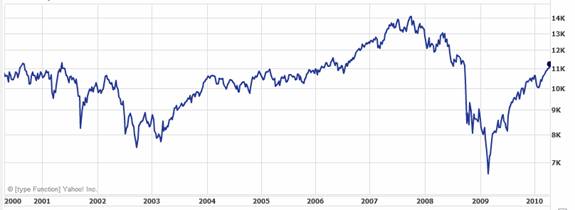- Help me with my golf game
- What’s a bear market?
- A dividend that’s never gone
down
I hope you had a great weekend. I got out and played 18 holes of golf; always
a humbling experience. The game of golf
is a great metaphor for investing. Sometimes you can do everything right given the information you have,
and things can go against you in a truly astounding way.
I keep my
left arm straight, head down, follow through and just as often as not, I’m
peeking into someone’s yard or digging through brambles for a $2 plastic
ball. (By the way if anyone has a
foolproof method for curing a truly debilitating slice, please email me at [email protected].)
Likewise,
sometimes you can do everything right in the markets and still lose. As prudent investors, we seek to buy
companies with low price–to–earnings
ratios in sectors with growth potential, with little debt and competent CEOs, a
history of raising their dividend, etc. etc.
And all
those best laid plans can go against us for any reason or no reason. Bad news in the broad market has made mutton
of even the best companies.
That’s truer in bear markets than bull
markets. People think of bear markets as
periods of time where the broad market moves downward. But that’s misleading. Bear markets typically dip downward at times,
but mostly move sideways.
Given that
definition, I think you can make a strong argument that we’ve been in a bear
market for at least 10 years.

Of course,
there’s no way to know when the bear market really ends. Like a poorly hit tee-shot, you can’t really
tell until you actually see where the ball has gone before you decide if it was
a bad shot or not. I’ve hit many a poor
drive that landed in the middle of a fairway with a good look at the pin.
So I truly
do not know if market will continue its bear market rally over the next couple
months. I can’t answer that question,
and anyone who claims to know one way or another is guessing.
As they
say, the market can behave irrationally longer than an individual investor can
remain solvent. That’s one of those
irksome “rules” that doesn’t help anyone become a better investor. It’s useless because it doesn’t come to a
logical conclusion, except to maybe behave irrationally, which is almost always
disastrous.
So my
advice? Don’t act irrationally. Sure, there are times to pull out the driver
on a par 3, but that’s the exception, not the rule. In a bear market, it’s more important than
ever to stick to your principles.
Use the
tendencies of the bear market to protect your portfolio the way hedge funds do:
by hedging.
To do that,
you need to give your portfolio exposure to the likelihood of either a
continued march upwards, as well as prepare it for the possibility of a
downward fall.
The easiest
way to prepare for good times and bad in the short term is to buy commodity
stocks.
Oil stocks
typically fare well when the market is doing well – for the simple reason that
people use more oil to produce, transport, and consume more goods.
Gold stocks
usually soar when the market does poorly because gold is seen as a safe haven
against calamity in the market and in paper currencies.
Buying both
types of stocks gives you exposure to the upside in either circumstance. Sure, you won’t make as much money as if you
had simply guessed correctly and bought all gold stocks or all oil stocks – but
do you really want to be using “guesswork” as an investment tool?
No. And today, buying gold and oil stocks is fantastically
simple. If you want a set it and forget
it gold investment, I recommend buying a “blue chip” gold stock like the
company we currently hold in our Global Commodity Investor
portfolio. It’s up 30% since our buy
announcement.
As for oil stocks, next week, one of my favorite oil
and gas companies is paying out a quarterly installment of its 7.7% annual dividend. You can find out the name of this company by
taking a risk free trial subscription to Ian Wyatt’s
service SmallCap
Investor Pro. This company
has paid dividends since it was founded – and raised their dividend an average
of once a year. If you want to claim a
dividend from this company, you have to be a shareholder before May 3,
2010. Click
here for the full details.
Good
investing,
Kevin
McElroy
Editor
Resource Prospector
 Facebook
Facebook
 Twitter
Twitter